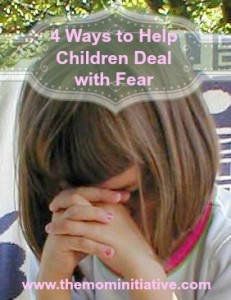 What’s a mom to do when her child who never minded being passed around a room of eager relatives freaks out at the sound of a flushing toilet? Are childhood anxieties real? The day my four year old screamed from the back of our mini-van in the Hobby Lobby parking lot, I hoped everyone around me believed childhood worries are real. Fears are not because of anything moms do wrong; childhood fears are part of being a child.
What’s a mom to do when her child who never minded being passed around a room of eager relatives freaks out at the sound of a flushing toilet? Are childhood anxieties real? The day my four year old screamed from the back of our mini-van in the Hobby Lobby parking lot, I hoped everyone around me believed childhood worries are real. Fears are not because of anything moms do wrong; childhood fears are part of being a child.
Instead of finding the quickest way to squelch a panic, a wise mom knows fears are not only normal, they are the evidence of a growing awareness of a child’s world. As the nervous system develops, along with the ability to manage sensory input, children wonder at their world. For example, once they develop an understanding of object permanence between 8 to 10 months of age, they want to know where their parent went if they leave their sight. Triggers arouse new questions and reactions for children as they move through new stages of growth: noises, strangers, darkness, doctors, masked characters. What’s a mom to do when a new fear trigger appears?
Fears present an opportunity to equip our children for life.
Whether clinging in panic to the rail of a crib or pleading in tears out the window, children who engage their fears are more likely to grow up to be confident adults. You don’t have to resort to trickery or sneaking out of rooms. Face those fears head on with your children! How we respond marks out the path for our children’s future; are you raising a paranoid child or a brave child? When fear grips your small one, use it to teach them:
4 Ways to Face Childhood Fears
Comfort – Let them know you love them and will be there for them. While you may be tempted to give in to a delirious demand, provide confident comfort that nurtures courage and peace in your growing child. Your comfort prepares them to understand that God is their loving Heavenly Father.
Experience – Instead of letting imagined fears dictate your boundaries, broaden your child’s experience base. They are less likely to fear what they understand. Play in the rain so they know how it feels. Listen to thunder and feel its rumble. Feel the tiny feet of a bug walking on your arm. Children follow bold parents into courageous territory.
Skills – Arm your child with skills to solve their problems and meet their needs. Independent skills prepare children to face the unexpected, knowing they are able to encounter and overcome their fears. Though they may cry for you to come turn on their light, teach them to sit up, lean over, and turn it on themselves. When the doctor asks for their name, resist the “mommy urge” to answer; let them learn to speak to the doctor themselves. Equip them to be brave.
Trust – Use crisis moments to teach children to discern the difference between what is true and false. Help them know they can talk to you about their concerns, but more importantly, help them know that they can talk to God. Mentor your child in learning to tell God their fears and ask for His help.
Everyone faces fear, but train children to say Psalm 56:3, “When I am afraid, I put my trust in You.” Take it from a mom who has faced fears of her own and anguished over a fearful little one. Our children need more comfort than we can offer; they need the divine, lifelong guarantee of God’s presence.
Sirens will sound, doors will slam, strangers will speak, and darkness will come. Will your child be ready? Let’s be comforting moms who equip our kids with the experience, skills, and trust needed to navigate days in the nursery to the playground to the dorm room and beyond!
- Election Day and empowering, enduring truths for moms - November 8, 2016
- Loving People: How Moms can Make Life a Lesson in Loving - October 11, 2016
- A Child’s Heart and the Hidden Treasure of Talking Back - September 13, 2016


